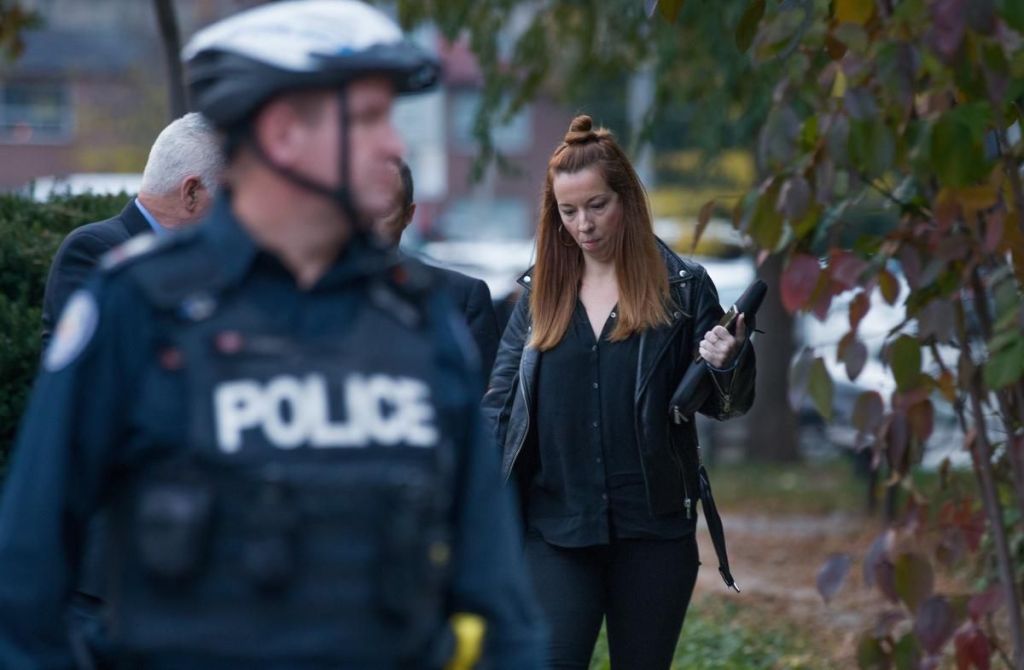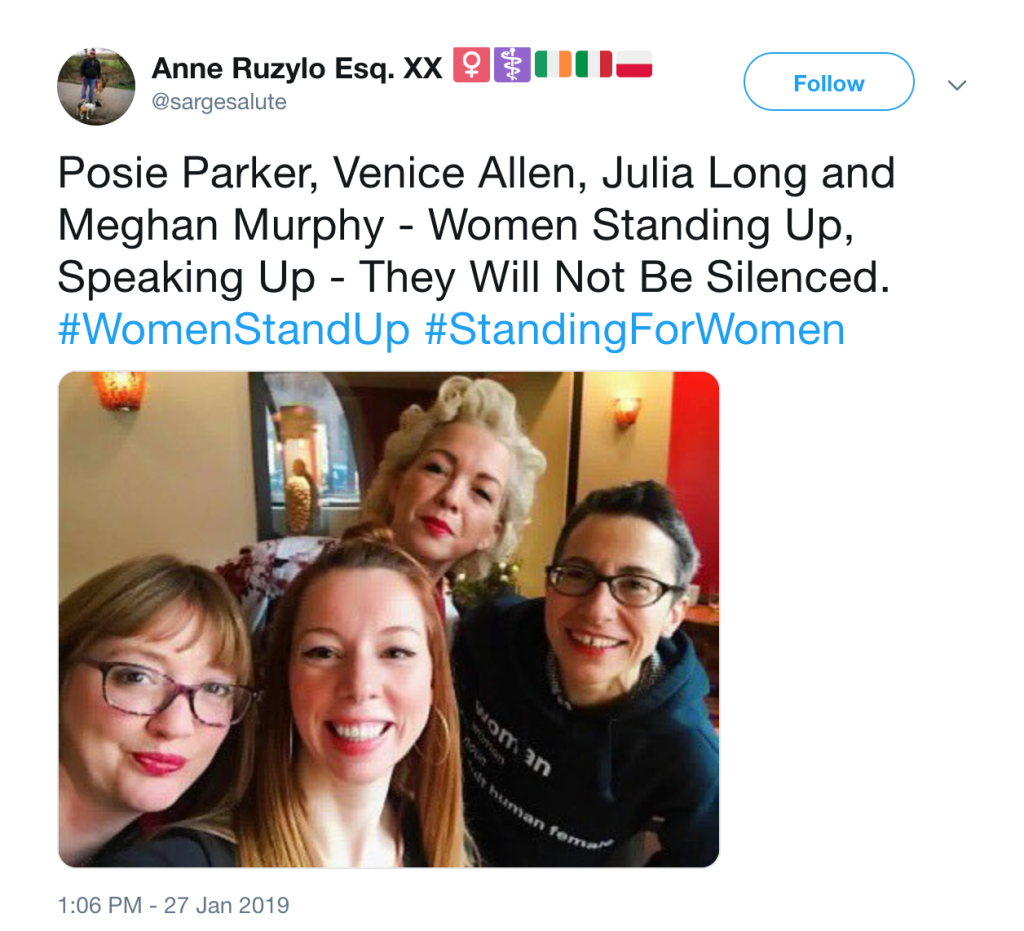On September 29, 2019, Self-identified feminist journalist Meghan Murphy gave a talk about her feelings regarding transgender women and feminism. It drew strong criticism across Canada and head-scratching abroad.

Murphy’s thesis is that transgender women are men because being transgender is “in fact” an impossibility and that transgender people put cisgender people at risk, with an especially vicious focus on transgender women.
Her talk drew a small audience of 45 given in a Toronto public library branch, attracting an estimated 1,000 protesters who camped outside and read books by Trans authors, sparking widespread debate about where the line stands between enabling hatred and enabling censorship.
Known History Of Inciting Hatred
This is something Murphy does regularly, and quite proudly. She started locally in Vancouver and along with a cohort of like-minded pundits pushing anti-transgender ideology has been extremely loud speaking her mind in opposition to transgender persons – specifically women – be recognized and protected from discrimination.

Vancouver-based intolerance
Metro Vancouver, one of the regions at the forefront of transgender rights in Canada, is oddly an incubator for extremist anti-transgender punditry. Bill Whatcott, Laura-Lynn Tyler-Thompson, Kari Simpson, Paul Dirks, all spent some time living and preaching their hate gospel on our region’s streets. This may be related to the Vancouver Parks Board putting forward a ground-breaking trans-positive guidelines in 2013 which inspired city-wide policy in 2016, or Vancouver Board of Education passing SOGI policies in 2014, the Province of British Columbia launching Trans Care BC in 2015, the province enshrining protections in 2016 from discrimination on the basis of gender identity or expression, or the country following suit in 2017, or the City of Vancouver denying funding to organizations who discriminate against transgender persons in 2019, or all of the above. Whatever it is, our region is a magnet for anti-transgender haters wrapping themselves in faith, feminism, science, free speech, or sheer malignance.
What are the laws, anyways?
The Canadian Charter of Rights guarantees the freedom to live free of discrimination, the freedoms of expression, and the freedom of belief, among others. Decades-worth of legal decisions on the matter tells us what to do when these freedoms intersect, and the latest jurisprudence tells us freedom of expression does not have priority over other freedoms. Rater, it must be weighed against its possible impact on the other charter rights listed in the Charter – for example against the freedom to live free of discrimination.
What does the charter mean to me?
The implementation of the charter within federal and provincial civil codes leaves us all with the freedom to say things as individuals, as long as they are true. Canadians have an absolute right to tell the truth, but only so long as they can demonstrate it is, in fact true. What the law does not give, however, is any absolute right to interlace truth with lie or deception so as to argue for a point that lacks factual merit through trickery.
Canada’s online-hatred vacuum
Since the Harper Conservative Government rescinded section 13 of the Canadian Human Rights Act which addressed discrimination online in 2013, a publisher of online hatred or of material advocating for discrimination on prohibited grounds can no longer be held accountable. One can put racist, misogynistic, transphobic, or other discriminatory content online. This is a known problem that needs addressing and I touch on the need to change this here, here, and here.
There is any indication from data on hate-motivated crime reported to police that shows that the month that this took place coincides with the bottom of a Vee in the hate crimes curve.

As the above image from one of my talks shows, a distinct increase of hate-motivated crimes followed the removal of online protection against online hatred. This indicates in my eyes a clear correlation between inciting hatred and the acts of hatred that such actions implicitly give permission to.
Free expression does not impinge on freedom from discrimination
A 2019 BC human rights tribunal ruling I was involved in, Oger v Whatcott BCHRT 2019 (7), determined that the freedom of expression and the freedom of belief that the Charter of Rights guarantees do not impinge on the competing right to live free of discrimination.
Although the scope of that ruling is limited to the BC Human Rights Code, it DOES have broad implications across Canada on its charter interpretation that when Bill Whatcott denied the existence of transgenderism to encourage people to discriminate against me on the basis of my gender identity – a prohibited grounds of discrimination in Canada – he violated my Charter rights more then his Charter rights would be violated by prohibiting him from doing this and that this was a necessary application of the Charter of Rights and Freedoms.
Notably, when we strip the core beliefs away to get to what Whatcott and Murphy say, we see they are in fact saying the same thing: being transgender is not true. Transgender people are wrong or liars or unwell, Canadians need to be protected from transgender people by discriminating on the basis of gender identity or expression.
So similar, yet treated so differently
The only difference is that our institutions would NEVER let Whatcott speak in them whereas they bend over backwards to let Murphy have her turn at the mike. Were I a woman of faith, the discrimination on the basis of faith would lead me to raise my eyebrows in interest.
Like Bill Whatcott, Meghan Murphy does have the right to speak her mind. However, she does not have any right to say whatever she wants, wherever she wants to, whenever she wants to, and however she decides. When we speak at venues owned or operated by institutions that have policies prohibiting discrimination, the content of the speech must conform to the policies of these institutions which are in place to prevent discrimination from being enabled there.
Institutional liability
Although Meghan Murphy’s words are out of reach of governance or personal consequences because she speaks at event and publishes only online, the institution that allows her to spread her message is party to her activity because they are allowing her to do what she does and are doing it with full knowledge of what she will say.
Institutions such as the Toronto Public Library, the Vancouver Public Library, and Simon Fraser University all have policies mandated by Canada’s human rights laws that prohibit discrimination at their facility.
By allowing Murphy or anyone else to speak at their facilities for the purpose of justifying discrimination on prohibited grounds, institutions are participants in the act. And unlike the speakers who are subject to only criminal and tort law when they speak, institutions have responsibilities set out by our human rights law.
Without the permission of the facilities at which a booking is made, the events Murphy uses to encourage outrage and discrimination would have been difficult to host. I believe that any institution that own the facilities at which Murphy or anyone else inciting discrimination speaks is liable for the discrimination they enable by allowing Murphy to counsel others to discriminate on prohibited grounds if the institution has policies prohibiting the act.
A failure to enforce policy on some grounds of prohibited discrimination but not on others is a violation of Canadian human rights laws. In fact, it is the reason why the Morgane Oger Foundation was created.
Failing Canadians
It is our institutions that are failing us rather than the deceptive individuals speaking for their lunch by inciting hatred against a mythical “them” through disinformation or disingenuous claims. I believe Canadians need to turn our attention to the administrators of our public institutions. Our institutions must be held accountable for meaningfully governing how ideas are shared from their facilities and for upholding meaningful and consistent standards for the use of their facilities.
Our public institutions enabling discrimination on prohibited grounds is an active choice on supposed charter grounds. They might be sued by JCCF or an equivalent absolute-freedoms organization for turning Meghan Murphy down, but they would win if only they had the backbone to do so.
Disappointingly, many of our Chief Librarians and our University Presidents still don’t fully understand that their participation in enabling transphobia is the same as enabling racism, Islamophobia, or White Nationalism. They still think it is less awful to allow hatred to be encouraged with their implicit approval and on their watch than to keep their facilities accessible for everyone in the communities they serve. I believe that this is a misunderstanding of their institution’s role and more importantly a misreading of Canada’s charter of rights.
Leave a comment